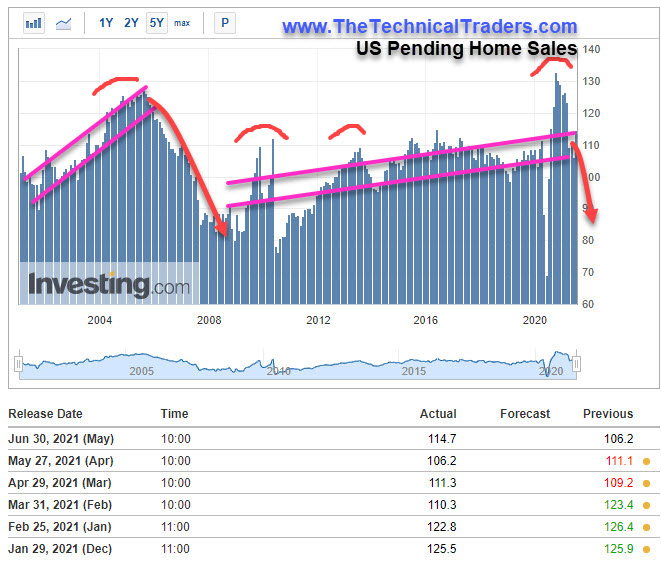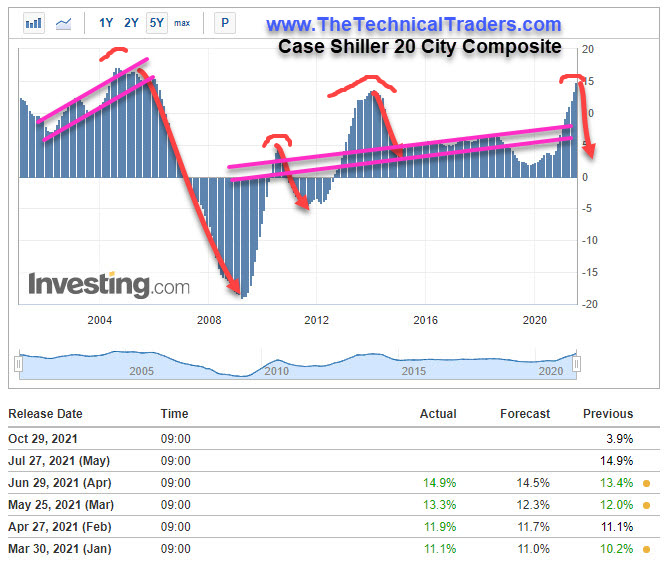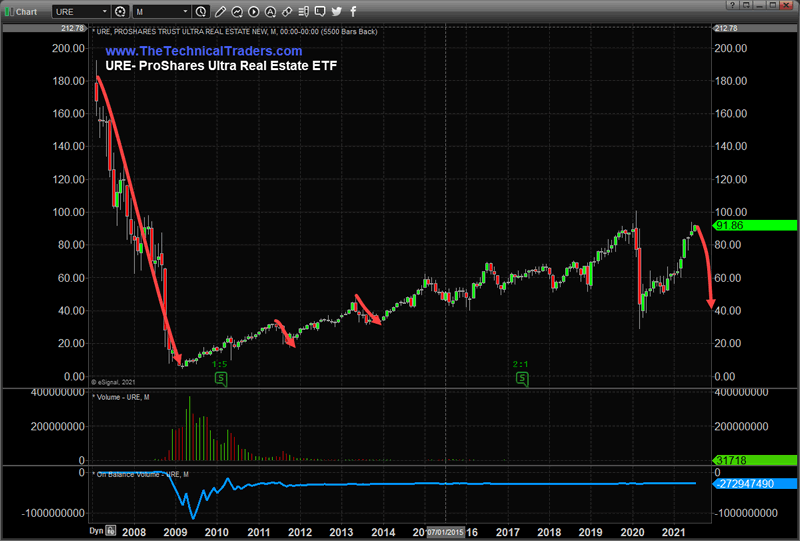US Home Buying Trends Showing Signs Of An Extreme Bubble Setup – Is It About To Burst?
Housing-Market / US Housing Jul 10, 2021 - 07:19 PM GMTBy: Chris_Vermeulen
As we continue to explore the recent data and setup related to the current Housing market bubble, this, Part II of our research, will continue to highlight the similarities we are seeing in the current market climate to the 2005~2008 Housing/Credit market event that crashed the markets over 15 years ago. Additionally, we’ll also highlight some of the efforts the US Federal Reserve and global central banks have taken to support the recovering global economy over the past 15+ years. Are they pushing the markets to extremes and will they be prepared for a reversion event if one takes place?
In the first part of this research article, we highlighted the Supply/Demand equilibrium function and the four laws of the Supply/Demand equation. It is important to understand that all price exploration/valuation functions operate within the boundaries of these Supply/Demand functions. Buyers and Sellers are always operating within these boundaries – even if they don’t know it.
Be sure to sign up for our free market trend analysis and signals now so you don’t miss our next special report!
The process of moving beyond the Supply/Demand equilibrium is usually driven by extreme market events – such as extreme demand for a product (a “fad”) or a very low supply component (where manufacturers can’t keep up with demand from buyers). This represents an extreme buying frenzy – where buyers chase prices higher attempting to get in before the peak (FOMO). In the opposite case, where supply is excessive or where buyers suddenly decide they are not interested in a product, this is when the Supply/Demand equilibrium level tends to fall below normal price equilibrium levels. This represents an extreme depressed market value – where deep price discounts are usually common.
My team’s research suggests the US Housing Market is shifting from an extreme Demand Event (FOMO) into a more moderate price reversion event that may align with a broad global market correction/reversion event.
Recently, we published a couple of articles that have begun to play out accurately.
- July 6, 2021: THE PEAK OF THE S&P 500 STOCK MARKET RALLY – ARE WE NEARING THE TOP?
- June 23, 2021: ARE THE US MAJOR INDEXES ROLLING OVER IN AN EXCESS PHASE PEAK SETUP?
- June 16, 2021: THE TREND IS YOUR FRIEND UNTIL IT ISN’T – DOW JONES AND TRANSPORTATION INDEX BREACHING CRITICAL PRICE SUPPORT AHEAD OF FOMC MEETING
My team and I believe the recent FOMC statements in support of continued asset buying and continued mortgage-backed security buying efforts may have actually set off a “confidence crisis” among investors and traders. This could be considered similar to the mid-2018 deep market decline set off by the US Federal Reserve pushing interest rate above 2.5% in a moderate rate increase process.
These types of “confidence crisis” events can be initiated by any number of factors in reality. A few examples could be: consumers/traders suddenly realizing price levels are well past extremes; a sudden shift in consumer spending habits; a belief that the future economy will be shaken up by unknown factors; or simply a supply/demand equilibrium extreme suddenly becoming very evident. The one thing that seems to happen in any case like this is that traders, investors, and consumers sometimes act like a flock of birds when these types of events unfold. At first, just a few notice the change in direction, then almost the entire flock of birds see the change and as one (except for a few stragglers) change course to follow the leaders.
We may be at this point now. If true and this begins to unfold over the next few weeks and months, then we may start to see a wave of reversion events taking place across many various asset classes (stocks, currencies, cryptos, homes, and others).
Now that we’ve set the process/function event up for you to understand, let’s continue exploring the US housing market data to attempt to confirm our expectations.
US Pending Home Sales Fall Dramatically From Post-COVID Highs
US Pending Home Sales have recently moved decidedly lower, after reaching highs above 130 on the chart below. The recent uptick from 106 to 114 may represent a temporary rebound after the nearly -30% decline in sales activity. Some people attribute this decline in sales activity to the lack of inventory available in certain areas. Whereas I attribute this decline to more of a consumer sentiment reaction. The process of a Supply/Demand peak price level event often coincides with a buyer’s understanding that a peak price event is taking place. They may then decide to hold off on making any immediate purchases because they believe price levels are excessively high.
History has shown this type of event to be very common; fads come and go. One minute the Pet Rock was hot and then it was not. Beanie Babies were hot for years – now they sell for pennies. Tulips were, many centuries ago for a brief few months, more expensive than homes and horses, then the Tulip market collapsed.
All of these are examples of buying extremes in a supply/demand function that determines operational boundaries of function – almost like Physics creates constructs that all of space/time adheres to.
The downward price trend of US Pending Home Sales suggests the post-COVID extreme buying phase ended in early 2021 and has continued to decline substantially. My research team believes a deeper decline is necessary to cleanse out the continued excess in the markets – which would potentially represent a 75~85 print in US Pending Home Sales for a period of at least 3~5 months.
Although lows on this chart are fairly short-term on average, we believe the excess buying phase prompted by the post-COVID-19 relocation event will eventually prompt a strong downside reversion event that will prompt many months of “price exploration” in an attempt to settle a market bottom.

Case-Shiller Index Shows Pricing Lags Demand Changes
This Case-Shiller 20 City Index clearly shows the current Real Estate market trend has reached extreme levels. Remember, this Case-Shiller Index is populated using 20 of the biggest metropolitan areas in the USA – it is not reflective of more rural areas. We’ve highlighted past extreme levels on this chart with RED drawn arcs in 2004~05, 2010~11, 2014~15, and 2020~21. Taking a look at the biggest declines in recent history, we watched the Case-Shiller Index move from +17 to -19 from 2005 to 2009. We also watched this Index fall from +13 to +2 from 2014 to 2019.
At the current extremes, we believe the Case-Shiller Index will likely fall into negative levels as the extreme market dynamics for Real Estate unwind across the globe. The US Federal Reserve and global central banks have pushed the envelope well beyond extreme levels with easy money policies, super-low interest rates, and low or no down payment options for buying a home. These policies have resulted in the resurgence of extreme buyer frenzy in the markets. The unwinding event will likely take many months to unfold, if our research is correct, and the process will require a breakdown of consumer sentiment related to opportunities in housing.

The fact that the Case-Shiller Index is still printing high levels while the other mortgage and buyer activity has dramatically weakened is nothing new. Price is always the last thing to breakdown when trends change direction. Take a look at the charts in this article to see how price levels breakdown after consumers change their buying habits and expectations. The current downtrend in mortgages and buying activity suggests a big price decline is about to hit the markets – possibly resulting in negative price growth for many months/years.
REIT & Real Estate Sectors Could Get Slaughtered
If you are seeing what we are seeing in these charts, the next thing we would want to see is confirmation of our research. We would want to see the US and global market indexes begin to break downward as traders shift expectations away from extreme appreciation trends and towards more protective expectations related to future economic reversion events. We would expect the US and global market indexes to begin to revert to lower levels (possibly moving downward by 12% to 15% or more) while the housing market trends continue to settle into a reversion event process. If this happens, then we would expect the Real Estate sector to start to move lower over the next 60+ days and then really begin to collapse towards COVID-19 lows.
We couldn’t begin to attempt to identify any real downside/bottom levels depending on how this event plays out. The extreme high price levels in big cities and rural areas suggest this rally in the housing market is a bit different than the one from 2004 to 2008. This time, everything is extremely overvalued. Therefore, the downside reversion event may be bigger and longer-term than what we experienced in 2008~2010.

The interesting thing about all of this, in our opinion, is that we’ve been closing out a lot of our research articles with “2020 and 2021 are certain to be full of some of the biggest trends we’ve seen, are you ready for these big trends?”. After the 2020 COVID rotation as well as the extreme rally in the markets after the March 2020 market bottom, here we are at the precipice of what may become one of the biggest market reversion events in history. Still, are you ready for these big trends?
Traders want to stay ahead of these trends and opportunities related to what may become the next big disruptive technology gains. As we move further into the 21st Century, it is very likely that space will become the DOT COM/Internet disruptive technology over the next 20 to 40+ years (or longer). That means traders need to start considering how this exciting new sector fits into their investment portfolio and where new industry leaders will settle.
Want to know how our BAN strategy is identifying and ranking various sectors and ETFs for the best possible opportunities for future profits? Please take a minute to learn about my BAN Trader Pro newsletter service and how it can help you identify and trade better sector setups. My team and I have built this strategy to help us identify the strongest and best trade setups in any market sector. Every day, we deliver these setups to our subscribers along with the BAN Trader Pro system trades. You owe it to yourself to see how simple it is to trade 30% to 40% of the time to generate incredible results.
From all my decades of experience, I can tell you that unless you have a solid foundation related to knowing when and where opportunities exist in market trends, you are likely churning your money in and out of failed trades. I will be presenting my two favorite strategies at the July Wealth365 Summit on July 13th at 4 pm and July 16th at 12 pm. The Summit is free to attend and offers unparalleled opportunities for learning…plus a potential prize or two!
Have a great day!
Chris Vermeulen
www.TheTechnicalTraders.com
Chris Vermeulen has been involved in the markets since 1997 and is the founder of Technical Traders Ltd. He is an internationally recognized technical analyst, trader, and is the author of the book: 7 Steps to Win With Logic
Through years of research, trading and helping individual traders around the world. He learned that many traders have great trading ideas, but they lack one thing, they struggle to execute trades in a systematic way for consistent results. Chris helps educate traders with a three-hour video course that can change your trading results for the better.
His mission is to help his clients boost their trading performance while reducing market exposure and portfolio volatility.
He is a regular speaker on HoweStreet.com, and the FinancialSurvivorNetwork radio shows. Chris was also featured on the cover of AmalgaTrader Magazine, and contributes articles to several leading financial hubs like MarketOracle.co.uk
Disclaimer: Nothing in this report should be construed as a solicitation to buy or sell any securities mentioned. Technical Traders Ltd., its owners and the author of this report are not registered broker-dealers or financial advisors. Before investing in any securities, you should consult with your financial advisor and a registered broker-dealer. Never make an investment based solely on what you read in an online or printed report, including this report, especially if the investment involves a small, thinly-traded company that isn’t well known. Technical Traders Ltd. and the author of this report has been paid by Cardiff Energy Corp. In addition, the author owns shares of Cardiff Energy Corp. and would also benefit from volume and price appreciation of its stock. The information provided here within should not be construed as a financial analysis but rather as an advertisement. The author’s views and opinions regarding the companies featured in reports are his own views and are based on information that he has researched independently and has received, which the author assumes to be reliable. Technical Traders Ltd. and the author of this report do not guarantee the accuracy, completeness, or usefulness of any content of this report, nor its fitness for any particular purpose. Lastly, the author does not guarantee that any of the companies mentioned in the reports will perform as expected, and any comparisons made to other companies may not be valid or come into effect.
Chris Vermeulen Archive |
© 2005-2022 http://www.MarketOracle.co.uk - The Market Oracle is a FREE Daily Financial Markets Analysis & Forecasting online publication.



